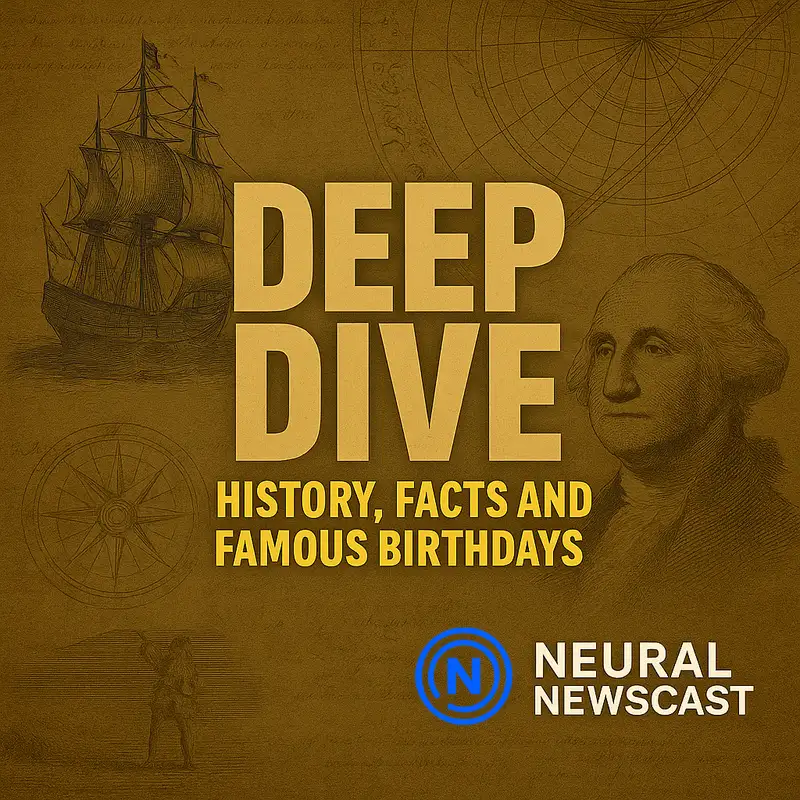Deep Dive: August 15, 1947: Independence, Activism, and a Postal Strike That Stopped New York - August 15, 2025
From Neural Newscast, this is today's daily news.
Informative and insightful stories one day at a time.
Only on NNC.
Welcome to Neural Newscast's Deep Dive. I'm Sarah and with me is Christopher.
Today we're exploring some fascinating topics.
August 15, 1947.
India steps out from under nearly 200 years of British rule and is born as the Dominion of India.
And honestly you can feel the seismic shift in world history in that single moment.
It's staggering.
Not just a change in flags, but a complex legal and constitutional transformation,
moving from colonial statutes to a domestic framework of governance almost overnight.
Right, and the scene on the ground matched that intensity.
Massive crowds, pageantry in New Delhi, but also raw, immediate emotion,
jubilation mixed with the gravity of what independence actually meant for millions.
There's also the legal engine behind it.
The Indian Independence Act of 1947, passed by the British Parliament, created two dominions, India and Pakistan,
and set a precise timetable for transfer of powers, which is unusual for decolonization, where timelines can be murky.
That timetable compressed so many decisions, borders, administration, transfer of military
command, and the human cost showed up quickly in the chaos that followed the partition lines,
which nobody could have fully anticipated.
Legally, partition presented an avalanche of problems.
property rights, princely states, accession,
and the delicate question of minority protections,
all laid on top of a hurried constitutional setup.
And yet, out of that rush,
you had leaders like Nehru delivering those unforgettable speeches.
The trist with destiny line still gives you chills,
signaling both triumph and the enormity of the task ahead.
Nehru's rhetoric mattered because it framed
the constitutional project as a moral and democratic mission,
which helped legitimize the nascent institutions that had to fill the vacuum the British left behind.
It's interesting how independence was simultaneously an end point and a starting gun.
An end to colonial rule, yes, but also the start of building everything from civil services to legal codes and universities that would define a new nation.
Exactly.
From a legal standpoint, the switch from colonial statutes to domestic law had to be orderly to avoid paralysis.
Continuity doctrines were invoked, so existing laws stayed in force until amended, pragmatic, but messy.
Messy is right.
Refugee flows, communal violence, and administrative breakdowns made the early years feel like triage,
and those immediate struggles shaped politics and society for decades.
And we shouldn't overlook princely states, not part of British India directly.
They had to choose accession, which created both negotiation room and friction.
Legally, integrating over 500 entities into one polity was unprecedented.
It's almost cinematic.
Diplomats, negotiators, and local actors racing against time and the clock set by the act,
while streets filled with people trying to rebuild their lives amid uncertainty.
The legal frameworks they adopted, eventual adoption of a republic constitution in 1950,
show the intended permanence.
Moving from dominion status to a sovereign republic was a deliberate constitutional maturation.
And that arc explains why August 15th feels like a hinge moment, a rapid, dramatic break,
but also the first step on a long, intentional journey toward a fully independent constitutional identity.
We can learn a lot from the legal choices made then, the emphasis on continuity, inclusion, and constitutionalism.
even as we recognize the limits and the suffering that accompanied the transition.
It's a reminder that independence is never just symbolic.
It's a messy, human, legal, and political process that reshapes lives and institutions in ways that echo across generations.
And from a legal historical lens, India's 1947 independence remains a case study in how law is deployed to manage monumental political change.
Imperfect, urgent, but foundational.
Today we celebrate the birthdays of Susan B. Anthony, 1820, Nicola Tesla, 1856, and Aretha Franklin, 1942.
Susan B. Anthony certainly stands out, born earliest, a titan of the suffrage movement,
whose legal fights still echo in courtrooms and statutes today.
Right, and diving into Anthony's life feels like opening a ledger of protest and legal strategy.
She wasn't just an orator, she orchestrated networks, petitions, and those famous travel
lectures that funded the movement.
Exactly.
She also understood the law in a way that was tactical, using existing legal frameworks
to expose contradictions, like attempting to vote in 1872 to force a Supreme Court discussion,
which the court dodged, but the publicity was priceless.
That 1872 arrest and trial, it's cinematic.
She insisted on speaking in court, refused to pay the fine, and turned the courtroom into
a national platform for suffrage.
You can hear why journalists at the time kept covering her.
From a legal perspective, that trial mattered because it highlighted the limits of the 14th and 15th Amendments when applied to gender,
and pushed activists toward a constitutional and legislative strategy rather than relying solely on litigation.
I love that point.
She pivoted fluidly between courtroom provocations and grassroots organizing,
building state-level campaigns while also lobbying Congress.
It's a two-front strategy you see in modern movements.
And less known.
Anthony kept meticulous financial records and correspondence, almost forensic in detail,
which later historians and lawyers used to trace the movement's infrastructure and funding,
useful for legal historians examining how social movements sustain themselves.
I didn't realize how archival her approach was.
Those papers essentially created a playbook for future advocacy.
Right? It's like she left both a tactical manual and a public narrative.
Precisely, she combined moral argumentation with procedural savvy,
knowing when to push for state amendments.
when to pressure Congress, and when to cultivate public sympathy through speeches and petitions.
And personally, she had this austere, relentless persona,
but also surprising warmth in private letters,
mentoring younger activists, offering practical advice on everything from fundraising to speeches.
That mentorship translated into institutional durability.
Organizations she helped found outlived her, eventually culminating in the 19th Amendment in 1920,
and courts continue to interpret gender equality claims in a landscape she helped create.
It's striking how her refusal to step away from controversy,
refusing to pay fines, confronting politicians, made the movement politically unavoidable.
Tactics that force a legal system to respond tend to accelerate change.
And, legally, her legacy persists.
Anthony reframed the question from personal grievance to systemic injustice,
setting the rhetorical and procedural boundaries that current gender equality litigation still navigates.
Thinking about her today, it's easy to see parallels with modern activists who blend media savvy, legal pressure, and organizational persistence.
She was an early template for that mix.
So on her birthday we don't just remember speeches, we recognize an architect of strategy whose methods ceded both policy change and jurisprudential arguments about citizenship and rights.
That lasting relevance that she gave future generations both a narrative and a toolkit is a powerful legacy to reflect on today.
Stay with us. More deep dive exploring coming up.
This is NNC, Neural Newscast.
We're here every day with reliable, fast-paced reporting that combines the speed of AI with the judgment of real people.
Find our full archive at neuralnewscast.com.
And we're back with more from Neural Newscast Deep Dive.
Did you know that in 1971, a group of postal workers in the U.S. staged a wildcat strike
that effectively shut down mail delivery in New York City for a week?
And it was illegal for them to strike under federal law?
That always catches people off guard.
Postal workers, you'd think, are the backbone of routine, not the source of a citywide
stoppage.
Legally, the Postal Reorganization Act and federal statutes bar strikes.
So this was a straight-up unlawful work stoppage.
What made it feel like a news movie was how fast it escalated.
One local walked off the job over pay and working conditions,
and within days the action spread from Manhattan to boroughs,
with neighborhoods suddenly getting no mail and lines at post offices getting longer.
Right, and from a legal perspective, the federal government had an arsenal,
injunctions, contempt charges, even the potential for criminal penalties,
because maintaining mail service is considered a matter of national interest.
The law treats it differently from a private sector labor dispute.
Yet despite that, management and labor were almost improvising in real time.
Supervisors trying to scramble routes, temporary hires,
and the union leadership insisting they didn't authorize a strike
while also pressuring for talks.
It became this chaotic, politically charged story.
That tension between official denials and on-the-ground solidarity
is classic in public sector labor law.
The rank-and-file act first, and by the time leadership and lawyers catch up,
The legal consequences have already begun to crystallize.
And the visual was striking.
Mailbags piling up, businesses missing checks, people suddenly wondering how dependent their daily lives were on a functioning postal system,
small irritations turned into real economic ripple effects.
Economically and legally, it's a cascade.
Undelivered payments, delayed government notices, potential disruption of court filings.
Courts themselves can be affected when statutory deadlines rely on mailed documents,
which then raises questions about equitable relief and extensions.
There was also a political element.
Elected officials weighing in, some sympathetic to workers, grievances, others demanding federal intervention.
It turned into a debate about labor rights versus obligation to the public.
And that's where the legal framing becomes political theater.
Invoking federal authority to enforce service can mobilize critics who argue for better labor conditions,
while supporters of strict enforcement emphasize predictability and the rule of law.
I love that detail about the creative workarounds.
Some communities organized neighborhood drop-offs, people collecting packages from distribution centers,
neighbors checking on each other's mail like a small-scale civil defense.
It's a reminder that law doesn't operate in a vacuum.
When formal systems fail, informal norms and community responses fill gaps,
and those responses can influence how quickly authorities move to resolve the dispute.
Ultimately, the strike didn't last forever.
Federal pressure, negotiations and injunctions brought most workers back within a week.
But the incident pushed forward conversations about postal reform and labor protections.
And legally it reaffirmed precedent.
Public sector employees in certain federal roles face severe limits on collective action,
and an unlawful strike invites immediate legal remedies.
but it also spurred policy discussions that sometimes lead to statutory changes down the line.
It's one of those moments where you see routine infrastructure laid bare,
and it forces a rethinking of how fragile everyday systems can be when labor tensions flare up.
Exactly.
A striking example of how legal constraints, human grievances, and logistical realities collide
and how those collisions often precipitate both immediate enforcement and longer-term policy debates.
We hope you enjoyed this deep dive.
From Sarah and all of us at Neural Newscast, I'm Christopher.
Join us next time.
That's it for today's episode of Neural Newscast, where AI meets accountability.
Catch up on past episodes at neuralnewscast.com.
And don't forget to follow or subscribe on your favorite podcast app.
Neural Newscast fuses real and AI-generated voices for fast quality news.
AI creates humans review.
We aim for accuracy, but errors can happen.
Verify key details.
Learn more at nnewscast.com.

